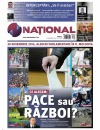On 30 November some 3 million voters are set to renew the national parliament. They are split between supporters of the outgoing pro-European government, weakened by corruption scandals but with a fair record as a member of Eastern Partnership, and the Communist opposition, nostalgic of the times when Moldova was part of the USSR and bending towards Moscow’s Euro-asiatic Union.
New parties related to the Russian minority have appeared before the vote, like Patria, whose leader however fled Moldova and sought asylum in Russia after his movement was excluded from the electoral competition for being financed by foreign money.
Ziarul naţional reveals that Patria was plotting on a coup along with pro-Russian extremist group Antifa, “in coordination with Ukrainian separatist organisations” and with financial support coming from “a foreign country hostile to Chisinau” — meaning Russia.
Whatever the elections’ result will be, observers fear that Russia will react by raising its influence on the former Soviet republic, directly or indirectly through pro-Russian organisations in the separatist republic of Transnistria.
This is why pro-European daily Ziarul naţional believes the vote is a choice “between peace and war”.
Meanwhile, Deutsche Welle reports that the deputy Foreign affairs minister Iulian Groza, said that “Moldova will apply for European Union membership in 2015”.
Do you like our work?
Help multilingual European journalism to thrive, without ads or paywalls. Your one-off or regular support will keep our newsroom independent. Thank you!












